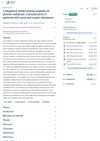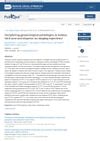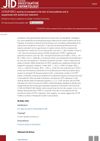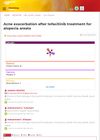 June 2023 in “Benha Journal of Applied Sciences”
June 2023 in “Benha Journal of Applied Sciences” Acne is caused by multiple types of bacteria.
[object Object]  May 2023 in “Research Square (Research Square)”
May 2023 in “Research Square (Research Square)” Patients with acne and insulin resistance have different blood metabolites compared to those with only acne, which could help in diagnosis and treatment.

Women with acne and hair loss, even if they have regular periods, often have polycystic ovary syndrome.
 April 2023 in “Journal of Investigative Dermatology”
April 2023 in “Journal of Investigative Dermatology” Both laser treatments improved acne scars similarly, but the Nd:YAG laser was safer and less painful, while the Er:YAG laser left patients slightly more satisfied.
 April 2023 in “Journal of Investigative Dermatology”
April 2023 in “Journal of Investigative Dermatology” Acne patients have higher skin mTORC1 activity, which is reduced by isotretinoin treatment.
 April 2023 in “Journal of Investigative Dermatology”
April 2023 in “Journal of Investigative Dermatology” Platelet-rich plasma treatment is generally safe and effective for hair loss, acne scars, skin discoloration, and facial rejuvenation, but deeper injections are better and multiple treatments can increase risk of side effects.
 April 2023 in “Journal of Investigative Dermatology”
April 2023 in “Journal of Investigative Dermatology” Taking nicotinic acid supplements might help with acne by affecting the skin's oil glands, but high doses are needed.
 January 2023 in “Al-Azhar International Medical Journal /Al-Azhar International Medical Journal”
January 2023 in “Al-Azhar International Medical Journal /Al-Azhar International Medical Journal” Acne patients have higher mTOR gene expression.
 January 2023 in “Dermatologic Therapy”
January 2023 in “Dermatologic Therapy” A new hand-held light therapy device was found to be safe and effective for treating mild-to-moderate acne.
 December 2022 in “Cureus”
December 2022 in “Cureus” Adult women with acne in Iraq often have more severe symptoms and hormone-related issues than younger girls with acne.
 December 2022 in “Research Square (Research Square)”
December 2022 in “Research Square (Research Square)” Isotretinoin treatment increases p53 levels in the skin, which may explain its effectiveness against acne.
 November 2022 in “Journal of Investigative Dermatology”
November 2022 in “Journal of Investigative Dermatology” Acne is genetically linked to a higher risk of depression, anxiety, schizophrenia, and bipolar disorder, with the strongest link to bipolar disorder.
[object Object]  September 2022 in “Dermato”
September 2022 in “Dermato” Adult acne is often related to hormonal disorders, especially in women, and may need long-term treatment involving specialists.
 July 2022 in “SKIN The Journal of Cutaneous Medicine”
July 2022 in “SKIN The Journal of Cutaneous Medicine” A new lotion with halobetasol and tazarotene successfully treats acne keloidalis nuchae.
 June 2022 in “Journal of Education, Health and Sport”
June 2022 in “Journal of Education, Health and Sport” The paper reviews acne treatments for women with PCOS but doesn't give specific advice.
 May 2022 in “Research Square (Research Square)”
May 2022 in “Research Square (Research Square)” Isotretinoin treatment increases p53 levels in the skin, which may explain its effectiveness against acne.
 April 2022 in “The Egyptian Journal of Hospital Medicine”
April 2022 in “The Egyptian Journal of Hospital Medicine” Platelet Rich Fibrin improves healing and reduces acne scars by slowly releasing growth factors.
 March 2022 in “Osmangazi tıp dergisi”
March 2022 in “Osmangazi tıp dergisi” Acne patients have higher levels of oxidative stress, but it's not clear if it causes or results from acne; antioxidants might help treat acne.
 October 2021 in “Dermatology Reports”
October 2021 in “Dermatology Reports” Tofacitinib, a hair regrowth treatment, may worsen acne.
 October 2021 in “The Egyptian Journal of Hospital Medicine ”
October 2021 in “The Egyptian Journal of Hospital Medicine ” Combination therapies work better than single treatments for atrophic acne scars.
 September 2021 in “CRC Press eBooks”
September 2021 in “CRC Press eBooks” Acne keloidalis nuchae is a hair loss condition affecting men of African descent, causing scar-like bumps on the scalp and neck.
 September 2021 in “International Journal of Biomedicine”
September 2021 in “International Journal of Biomedicine” Certain gene variations are linked to a higher risk of severe acne, suggesting a genetic influence on the condition.
 August 2021 in “Research Square (Research Square)”
August 2021 in “Research Square (Research Square)” Borneol Essential Oil could be a natural and safe acne treatment.
 July 2021 in “Journal of dermatology research and therapy”
July 2021 in “Journal of dermatology research and therapy” Using combined treatments can help manage acne by targeting the bacteria and skin changes that cause it.
 July 2021 in “Journal of emerging technologies and innovative research”
July 2021 in “Journal of emerging technologies and innovative research” Ayurvedic methods successfully treated severe acne in a patient.
 June 2021 in “International Journal of Research in Dermatology”
June 2021 in “International Journal of Research in Dermatology” Women with acne and PCOS should be checked for insulin resistance and related symptoms.
 June 2021 in “Dermatologic surgery”
June 2021 in “Dermatologic surgery” Researchers suggest using a standard question and 5-point scale to measure patient satisfaction with acne scar treatments.
 June 2021 in “Journal of The American Academy of Dermatology”
June 2021 in “Journal of The American Academy of Dermatology” The "spade sign" is a highly specific indicator for diagnosing acne keloidalis.
 April 2021 in “International Journal of Research in Dermatology”
April 2021 in “International Journal of Research in Dermatology” Most adult females with acne do not have hormonal imbalances, but some show signs of excess male hormones.
 December 2020 in “Benha Journal of Applied Sciences”
December 2020 in “Benha Journal of Applied Sciences” People with severe acne tend to have higher levels of betatrophin.






























